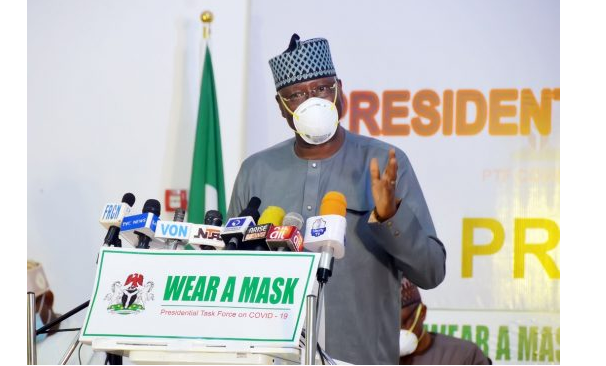Lagos, Kano, Borno Account For 52% Coronavirus Deaths – FG

President Muhammadu Buhari has approved the extension of the gradual ease of lockdown by another two weeks.
The Chairman of the Presidential Task Force on COVID-19 and Secretary to the Government of the Federation, Mr. Boss Mustapha, who disclosed this at the PTF press briefing on Monday, said security agencies had been directed to ensure strict enforcement of the use of face masks and the ban on interstate movements.
At the press conference, the Minister of State for Health, Dr. Olorunnimbe Mamora, said Borno, Lagos and Kano states accounted for 52 per cent of COVID-19 deaths in the country.
Buhari had, in his broadcast on April 27, ordered gradual reopening of the economy. He also imposed an 8pm to 6pm curfew on the nation and directed that interstate human and vehicular movements should stop.
The PTF, in the guidelines it issued a few days after the presidential address, called for the use of face masks in public places in addition to maintaining social distancing.
But despite the guidelines, there have been interstate movements, particularly by Quranic school pupils in the North, Almajirai, who are being hidden and conveyed to the South in food trucks.
The Almajirai have been turned back in southern states such as Cross River, Osun and Lagos.
As of April 27, when the President addressed the nation, the country had 1,337 cases of coronavirus. But on Sunday, the figure shot up to 5,959.
Mustapha, on Monday, said the PTF reviewed the first phase of the eased lockdown and lamented Nigerians’ non-compliance with the ban on interstate movements and other guidelines issued by the task force.
He, however, said measures put in place had slowed down the transmission of the virus by elongating the doubling time which had changed from seven to 11 days.
Mustapha recalled that the President had addressed the nation three times to underscore the seriousness of COVID-19.
He stated,
On each of those occasions, he pronounced measures aimed at containing and controlling the spread of the disease.
Some of these measures introduced in phases and modified as we progressed, include lockdown of specified high burden areas, travel ban, nationwide curfew, as well as advisories aimed at preventing and controlling the virus.
The SGF regretted that the outcome of the phase one of the eased lockdown had “been mixed.”
He stated,
While some objectives were met, our assessment showed that non-compliance was rampant, but the PTF nevertheless continued to persuade the populace through its messaging and daily briefing on the need to take responsibility.
Nine LGs account for 51% of COVID-19 cases in Nigeria – FG
Mustapha said nine local government areas in the country accounted for 51 per cent of the total number of COVID-19 infections in the country.
He stated,
Our surveillance, infection prevention and control activities identified nine high burden local government areas in the federation reporting high number of cases and accounting for 51 per cent of the total number of infections in the country. All the nine are densely populated local government areas nationwide.
He also noted that the health care system had been better equipped to detect, test, isolate and treat every case, and trace every person who came into contact with a positive case.
The SGF added that COVID-19 laboratories had increased from 15 on April 27 to 26; adding that the total number of tests had risen to 35,098.
Mustapha said despite the gains recorded, the PTF in its report to the President concluded that there was still a long way to go.
He stated,
The inevitable conclusion of the PTF is that the fight against COVID-19 is long term as the virus is not likely to go away very soon.
This is further underscored by the fact that no vaccine is expected till around the end of 2021. Nigeria is not where we wish to be in terms of control, ownership, infrastructure and change of behaviour. We must do more.
The PTF chairman said the task force would focus its policy on community ownership.
He said in the next phase, communities would take ownership of the COVID-19 fight, adding that infrastructure and other public health measures would be provided in every community.
Nigeria not ready for full reopening of economy – FG
Mustapha said, “The reality is that in spite of the modest progress made, Nigeria is not yet ready for full opening of the economy and tough decisions have to be taken for the good of the greater majority. Any relaxation will only portend grave danger for our populace.
Advisedly, the current phase of eased restriction will be maintained for another two weeks during which stricter enforcement and persuasion measures will be pursued.
According to him, the two weeks extension of phase one of the eased restriction is also to enable other segments of the economy to prepare adequately for compliance with the guidelines, preparatory to reopening in the coming weeks.
He said the President had approved that
the measures, exemptions, advisories and scope of entities allowed to reopen under phase one of the eased locked down, shall be maintained across the federation for another two weeks effective from 12 midnight today to June 1.
Buhari extends Kano lockdown
Mustapha also disclosed that Buhari had also granted approval for extension of the existing lockdown in Kano for an additional two weeks.
According to him, the Federal Government extended the lockdown in Kano because the pandemic hit the states with a bang.
He said the unknown causes of many deaths in the state were sources of worry for government.
Mustapha stated, “Community transmission had been occurring before the index case was established. We don’t want Kano figure to escalate and compete with that of Lagos and the only way to achieve this is to interrupt community transmission in Kano. It requires a drastic step.”
FG plans lockdown in states, LGs with increasing cases
He also said government would impose
precision lockdown in states, or in metropolitan/high-burden LGAs (local government areas) that are reporting a rapidly increasing number of cases, when the need arises.
According to him, this will be complemented with the provision of palliatives and continued re-evaluation of the impact of the intervention.
The SGF reminded the governors of the need to align their state measures with the guidelines issued by the PTF.
Mustapha said there would be vigorous implementation of interstate lockdown and curfew among others in the coming weeks, urging citizens to cooperate with security agencies.
The SGF stated,
The level of compliance has been reviewed and a specific directive has been issued to the security agencies to carry out strict enforcement of all measures.
These include the nationwide curfew from 8pm to 6pm; the ban on interstate travels and the wearing of facemasks/coverings in public.
He, however, urged security agents to be mindful of the rights of citizens, adding that citizens should recognise the danger of COVID-19.
Lagos, Kano, Borno account for 52% COVID-19 deaths, says minister
The Minister of State for Health, Mamora, said Lagos, Kano and Borno states accounted for 52 per cent of COVID-19 deaths in the country.
Mamora also said 60 per cent of COVID-19 cases in the country were aged between 21 and 50 years.
As of Sunday, Nigeria had recorded 5,959 coronavirus cases, with 1,594 discharged, while 182 patients had died.
Lagos State with 2,550 cases, the highest in the country, is followed by Kano, which has 825 cases and the Federal Capital Territory that has 418 cases. Borno State has 215 cases.
On Monday, Mamora said the Federal Government had sent more test kits and laboratory consumables to Kano State. According to him, 660 tests are being conducted in the state daily.
COVID-19 cluster cases found in LG in Sokoto – Minister
Mamora added that the government team sent to Sokoto
curiously found a cluster of COVID-19 cases in one local government area
saying measures were being taken to reach more communities nationwide.
The minister also said,
Till date, sadly, Lagos, Kano and Borno states accounted for 52 per cent of deaths. The increased daily record is largely due to our increased tracing and testing capacity which is mainly as a result of increased community mobilisation and awareness creation.
It is not our job to provide PPE for police – PTF
The National Coordinator of the PTF, Dr Sani Aliyu, said the allowance for security personnel deployed in the enforcement the COVID-19 lockdown was receiving attention.
The security agencies, especially the police, had accused the Federal Government of neglecting their welfare and not providing them with personnel protective equipment on the “delicate” assignment.
Responding to a question, Aliyu said,
We are currently processing this. We have been awaiting paper work; the paper work needs to be completed before we go ahead to pay.
He, however, absolved the PTF of the responsibility of providing the PPE.
As regards the PPE, we distributed some PPE to frontline non-health workers last week, but a lot of agencies that deal with security do have budget lines for the PPE and we expect them to procure the PPE using their budget,
he said.
States should be prepared to tackle community transmission – PTF
Aliyu said the PTF would allow states to tackle community transmission in the coming weeks.
He said,
We have activated community engagement team. Moving on to the next phase, our intention is to give more leeway to state governments to take decisions as regards to the response. It will not be driven primarily at the federal level beyond the next few weeks.
The Director General of the Nigeria Centre for Disease Control (NCDC), Dr. Chikwe Ihekweazu, at the press briefing said Buhari would find it easier to fully reopen the economy after the PTF had conducted a comprehensive review of its guidelines.
He said,
It would be much easier for Mr President, in two weeks’ time, if we go back to him not with a narrative of ‘do I open the lockdown or not?’ but with a narrative of ‘in the event that we are ready and the time has come, this is the preparation we have made as an industry. These are the new guidelines we have come up with in order to reopen safely.’
This will make his decision a lot easier. But it’s not just the big industries; the aviation and education sectors are very well regulated, so it’s a bit easier to make those decisions.
Source: Punch

Justin Nwosu is the founder and publisher of Flavision. His core interest is in writing unbiased news about Nigeria in particular and Africa in general. He’s a strong adherent of investigative journalism, with a bent on exposing corruption, abuse of power and societal ills.













